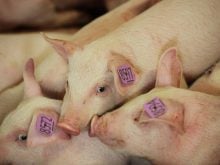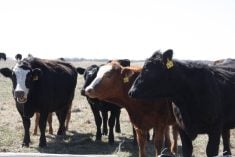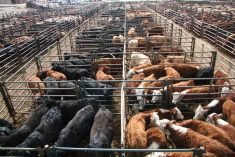LETHBRIDGE, Alta. – Intensive livestock operations can expect tougher and more costly environmental controls in the future, says an engineer from a Texas university.
However, new technology to reduce odour and dust must be practical for intensive livestock producers or else researchers will not recommend it.
“Great ideas are great but until we can prove they work, we are not likely to recommend them,” said Brent Auvermann at a recent manure management conference in Lethbridge.
Auvermann consults with Alberta Pork and the Alberta Cattle Feeders Association on manure management strategies.
Read Also

Canada told trade crisis solutions in its hands
Canadians and Canadian exporters need to accept that the old rules of trade are over, and open access to the U.S. market may also be over, says the chief financial correspondent for CTV News.
Improved technology to mask odours, control dust or prevent water pollution is under scrutiny in several laboratories.
To keep the odour and dust under control, Auvermann advocates integrated corral management. This means animals and pens need to be kept clean and dry because odours brew in warm, wet places.
Water sprays are often used to suppress feedlot dust caused by traffic and animals scuffing up dirt and manure. However, too much damp can exacerbate odours.
Scientists are studying how much ammonia is released when irrigation systems are used to control dust. The experiments include adding a deodorant to the spray to mask odour caused by excessive ammonia emissions.
In Texas, Auvermann is looking at creating water curtains to slow dust and odours. A curtain of water is created from an irrigation pivot system. The pivot releases about one gallon per minute per foot of drop. The system releases downward fine mists of water for short periods at critical times of the day. This wall of water is in early development, but did seem effective under certain weather conditions.
In Alberta, confined feeding operation law focuses on odour control.
Producers have been told to implement cleanliness as part of their normal farm management routine.
“It’s just common sense. Keep the floors dry and clean and keep manure dry, keep the animals clean,” said John Feddes, an agricultural engineer from the University of Alberta.
Researchers like Feddes are looking at measuring the levels of odour emissions.
They know odour travels on dust and they know 80 percent of dust particles found in barns cannot be seen. Some are small enough to penetrate lung tissue.
One line of study is to spray a fine mist of canola oil to keep down the dust. However, the odour persists.
“If you sprinkle oil in poultry or pig barns you remove 70 percent of the dust but you only remove 20 percent of the odour,” he said.

















